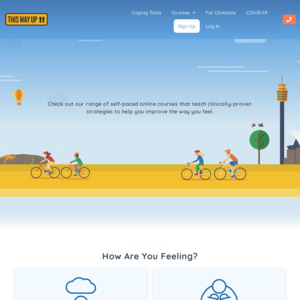Hi all, first time poster.
This Way Up, at St Vincent’s Hospital in Sydney, is a specialised anxiety clinic that has produced some excellent online CBT programs.
This Way Up is currently waiving their registration fee for patients for the month of April. This might be a useful resource for those who are currently experiencing anxiety and would benefit from accessing internet based CBT resources.
"With the outbreak of the coronavirus (COVID-19) and its extensive media coverage, it makes sense to be concerned about your health, the health of your loved ones, and the uncertainties that lie ahead.
Being alert to potential threat is a normal coping mechanism, which helps us to detect danger and take steps to protect ourselves.
However, when our worries become persistent, excessive, and begin to negatively impact on different areas of our lives, anxiety can become a concern in itself.
Anxiety affects our thoughts, feelings, and behaviours, so if you have taken reasonable steps to prepare yourself and are following the official guidelines, but are finding yourself feeling worried, panicky, overwhelmed, or compelled to do things you may not otherwise do, it may be helpful to focus on strategies to manage anxiety.
Below are some ways to take care of yourself and manage your thoughts, feelings and reactions to the COVID-19 outbreak:
Tip #1. Make a note of accurate information from credible and reliable sources that provide facts on how to protect yourself e.g., Department of Health, and follow the official guidelines, even if they go against your plans and feel disruptive or disappointing.
Tip #2. Consider seeking additional information on a “need to know” basis only – if it’s not helping you make an important decision or take appropriate action, the additional information may not be useful and act to exacerbate anxiety.
Tip #3. Set a daily limit on the time and frequency of consuming information – this may mean unfollowing accounts on social media or taking a break from live TV.
Tip #4. Focus on the things you are in control of, such as washing your hands, maintaining good hygiene, and sticking to a normal routine where possible.
Tip #5. Try to be mindful and fully present during your normal everyday activities to help you shift your thinking away from worrisome thoughts.
Tip #6. If you notice yourself persistently thinking of or imagining the worst case scenarios – try to balance these thoughts with considering the positives that may come out of this situation.
Tip #7. Engage in your favourite hobbies or relaxing activities at home – while we may be constantly exposed to uncertainty elsewhere, you can try to consciously create a calming environment at home.
Tip #8. If you’re feeling lonely or isolated, speak with your friends, family, or people you know on the phone or via Skype – try not to passively follow updates on social media. Social distancing doesn’t need to mean that you can’t stay connected with others!
Tip #9. If you have been or are currently in treatment for a mental health condition, speak with your health professional about options to continue your sessions over the phone or via videoconferencing.
Tip #10. Try to maintain a sense of calm and hope by focusing on the small positive things that are happening – each day before settling for bed or upon waking up, try to bring to mind three positive things that have happened during the day, no matter how small, or the three things you are looking forward to in your day.
Finally, try to take it one day at a time and stay in the moment – you can download our free short mindfulness meditation to help you refocus on the here and now."


Great initiative and advice guys!